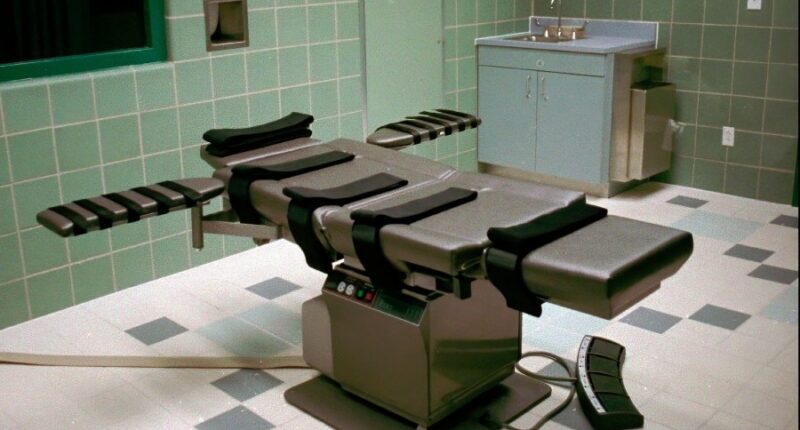Share this @internewscast.com

CHICAGO (AP) — An Indiana man found guilty of the 2001 rape and murder of a teenage girl was executed by lethal injection early Friday. This marks the state’s third execution since reinstating the death penalty last year.
Roy Lee Ward, 53, was executed at the Indiana State Prison in Michigan City. The Indiana Department of Correction announced that the procedure commenced shortly after midnight and Ward was declared dead at 12:33 a.m.
Ward chose a last meal from Texas Corral, consisting of a hamburger. His final words, as reported by the Indiana Department of Correction, were “Brian is going to read them,” although it was uncertain when he made this statement.
He was found guilty of the rape and murder of 15-year-old Stacy Payne. Officials stated that Ward attacked the girl using a knife and dumbbell in her family’s home near Dale, approximately 30 miles (48 kilometers) east of Evansville. The crime deeply affected the small community of about 1,500 residents.
Having exhausted all legal avenues over more than 20 years, Ward’s attorney, Joanna Green, noted days before the execution that Ward was “very remorseful” for the crime.
Ward’s execution occurred amid concerns regarding Indiana’s management of the potent sedative pentobarbital. Last year, state officials lifted a 15-year hiatus on executions, citing the acquisition of lethal injection drugs that had been unavailable for years.
The Indiana Department of Correction said it had obtained “enough pentobarbital to follow the required protocol” for Ward’s execution. Ward’s attorneys had raised concerns about the use of the drug and how the state stored it, including temperature issues.
Among 27 states with death penalty laws, Indiana is one of two that bar media witnesses to executions. Ward’s witness list included attorneys and spiritual advisers.
His case trailed through the courts for more than 20 years.
Ward was convicted of the crimes in 2002 and sentenced to death. But after the Indiana Supreme Court overturned the conviction and ordered a new trial, he pleaded guilty in 2007. A decade later, the U.S. Supreme Court declined to hear the case. In 2019, he sued Indiana seeking to stop all pending executions.
Last month, the Indiana Supreme Court declined to stay the execution and Gov. Mike Braun rejected Ward’s clemency bid.
The victim’s family members said they were ready for justice to be carried out, remembering Payne as an honor student and cheerleader with an influence beyond her short life.
“Now our family gatherings are no longer whole, holidays still empty. Birthdays are sad reminders of what we lost,” her mother Julie Wininger told the parole board last month. “Our family has endured emotional devastation.”
Ward skipped the parole board interview for his clemency bid, saying he didn’t want to force the victim’s family to travel to the prison and that he couldn’t always say what he meant. Attorneys say Ward was recently diagnosed with autism spectrum disorder, which affected his ability to communicate.
One of his spiritual advisers, Deacon Brian Nosbusch, said ahead of the execution that Ward thought deeply about his actions.
“He knows he did it,” Nosbusch said. “He knows it was horrendous.”
___
Golden reported from Seattle.

















